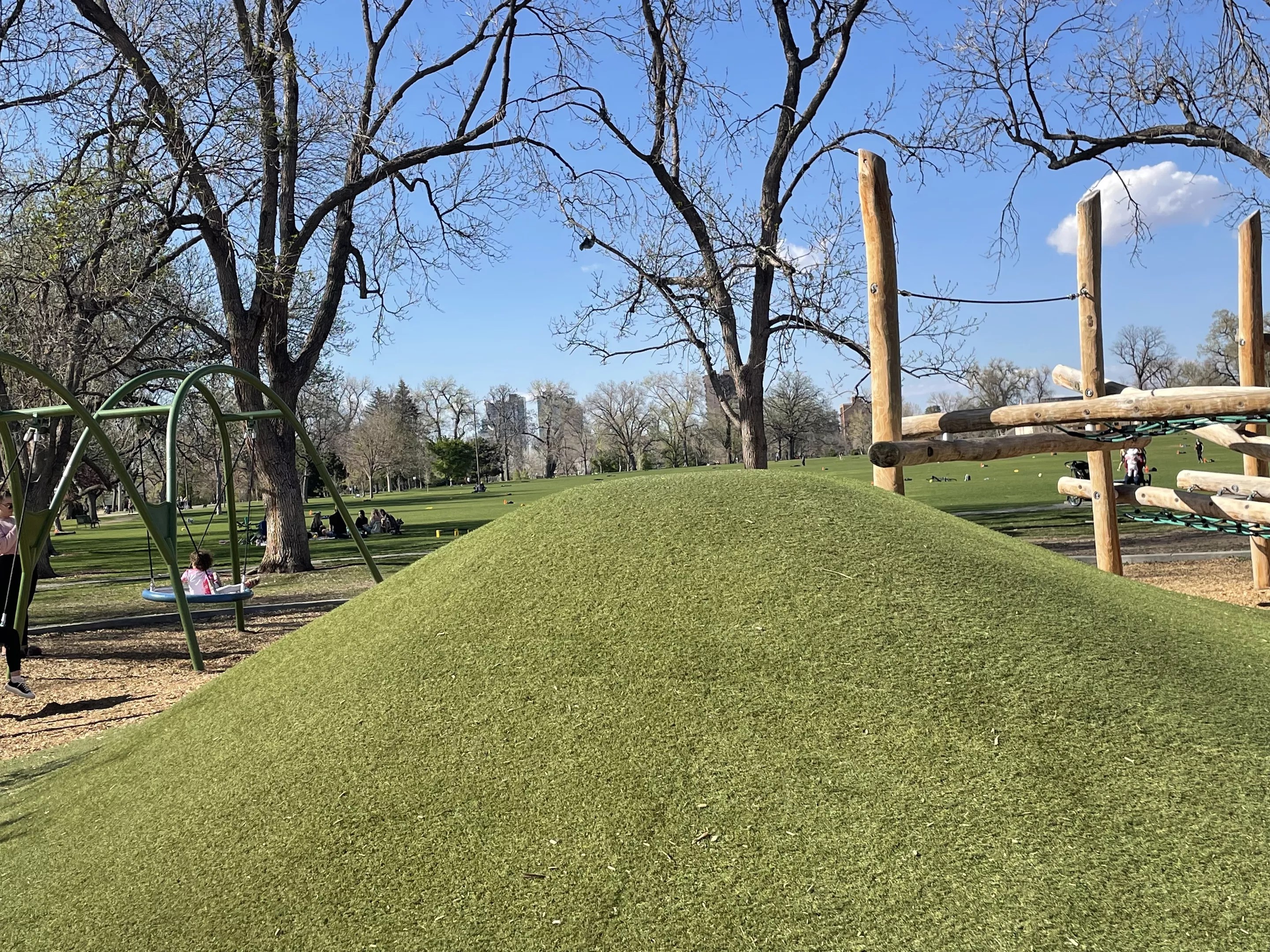
Catie Cheshire

Audio By Carbonatix
Chandra Rosenthal, Rocky Mountain office director for Public Employees for Environmental Responsibility, lives near Robinson Park, located at 200 Fairfax Street. When the park’s playground got an update thanks to a 2017 Elevate Bond, Rosenthal was concerned that artificial turf was part of the project.
“I was so impressed, and then I saw the artificial turf section and I thought, ‘Oh, my gosh, why didn’t they use bark, like they did under the swings?'” she recalls. Artificial turf often contains PFAS, chemicals that don’t break down over time; some studies suggest they can cause adverse health conditions, including cancer.
PEER works with government employees to improve environmental laws and regulations. Rosenthal thought that Denver Parks and Recreation might not know about the dangers of PFAS, and she reached out to the department in February. In April, she finally got to meet with a contingent that included Gordon Robertson, Parks and Recreation director of planning, design and construction, as well as other members of the finance, design and planning divisions. A Denver Department of Public Health and Environment scientist was also present.
Rosenthal left the meeting feeling encouraged: the parks department, she says, seemed open to learning more about PFAS and exploring alternatives to artificial turf for the city’s parks.
According to Robertson, the city is constantly monitoring the science behind PFAS, but plans to continue using artificial turf until the science is definitive; he’s working with the DDPHE to help make that determination. “It’s been a long, evolving scientific process,” he says. “To our knowledge, there isn’t a direct or clear determination that there’s negative effects at this time…. We’re definitely monitoring and keeping track of it.”
The main use of artificial turf in Denver’s parks system is on athletic fields. For the 2022 spring and summer season, the department has just fourteen artificial turf fields out of over 300 fields. Grass fields are better for play, Robertson says, but the department can’t keep up with the level of maintenance required to keep grass fields constantly playable. A heavy rainfall can put a grass field out of play for as much as two weeks, he notes. That’s where artificial turf fields come in.
“They are available 24/7,” Robertson explains. “There’s never downtime. They are always consistent. Whether it’s been raining or snowing or whatever it might be, whatever the weather conditions are, you can play on them at any time. So they offer a real benefit to athletic leagues.”
During the meeting, Robertson said that the department has no plans to install additional artificial turf fields. And while there are plans to add artificial turf to playgrounds, unlike the artificial material that Parks and Rec uses for fields, the product used for playgrounds, SYNLawn, doesn’t contain PFAS because it doesn’t have chrome rubber. Rather, it’s a plant-based product. Playgrounds in Washington Park and Bible Park have SYNLawn; Robertson says that kids enjoy the artificial turf because they can run on it and slide without depleting it.
Rosenthal says she plans to get a copy of the testing done on SYNLawn to confirm that it is safe. Since the EPA’s working definition of PFAS is smaller than the definition on its computational models, fewer chemicals stand to be regulated than the total number in the PFAS class, she explains. PEER sued the EPA on April 28 for failing to respond to a Freedom of Information Act request regarding the agency’s multiple definitions of PFAS in a timely manner.
“The [Environmental Protection Agency] is doing the country a disservice by not regulating this,” Rosenthal says. “It’s very political.”
But Colorado isn’t waiting for a resolution of this case before attempting to regulate PFAS. House Bill 1345, sponsored by representatives Lisa Cutter and Mary Bradfield and senators Julie Gonzales and Pete Lee, passed through the House and is currently in the Senate Finance Committee. If the bill passes, the sale or distribution of carpets or rugs, cookware, cosmetics, fabric treatments, food packaging, juvenile products, oil and gas products, textile furnishings or upholstered furniture that contain intentionally added PFAS chemicals would be prohibited starting in January 2024.
Robertson says the department will monitor the bill’s progress; if it passes, Parks and Recreation will determine how it could apply to Denver’s facilities. “If there’s good evidence and folks decide that it’s something that is unhealthy, then we would work to find other solutions,” he says. “We have to use the current product. It’s just the best product today for our purposes…. But they continue to look at it and we continue to be ready to respond.”
Rosenthal is encouraged by Parks and Recreation’s response, and hopes to keep working with the city to make sure that artificial turf is used with care, then disposed of properly. And she wants to be sure that there’s no possibility that PFAS chemicals are part of future playground projects.
“This certainly isn’t a blame game, where we’re going to try and hold one person accountable for these decisions,” she says. “It’s an education campaign so that the city can make these changes, because we have a lot of confidence that they want to do what’s right for the people in Colorado.”